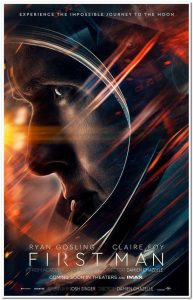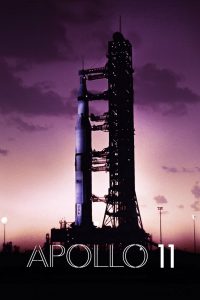The Apollo space missions were championed for their opportunity to give humanity a different perspective. Those things that seems so important down here on earth’s surface fade when you’re looking back at a small blue ball from the depths of space. And Damien Chazelle’s First Man is really about perspective.
Chazelle and writer Josh Singer (The Post, Spotlight) are interested in a different view of a story everyone knows the ending of. Yes it’s ostensibly about the first landing on the moon. But it’s actually the story of a man deeply depressed, deeply disconnected from his family and his life. After the death of his toddler daughter from cancer, experimental research test pilot Neil Armstrong (Ryan Gosling) – an already quiet, detached man – becomes internally untethered. He only sees some salvation, some relief, some way of moving forward in reaching literally and figuratively higher. He volunteers for NASA’s Gemini space program, and the fact that every second of every test and mission carries short odds of death are possibly part of the attraction. Gosling plays Armstrong as the silent, reserved type that he most iconically played in Drive – which he’s really good at – but you can almost see, through the close-ups of his eyes, him slowly fading away inside.
There are parts that talk to the larger story – the race against the Russians, the public and political questions of the worth of the project, what success might mean for the future of America and the world – but really this is about one family’s struggle to piece their life back together. Neil tells his wife Janet (Claire Foy) that the NASA project is their chance for a fresh start, but it’s clear that it’s not going to be one for her. She’s the one left trying to keep their young family going, while always ready to be the next wife told her husband isn’t coming home, to tell her sons about their father. This is a role that could have easily slipped into cliché but is saved by an excellent performance from Foy. Her character is grounded and grounding, and there are affecting moments like when she comforts a grieving friend, or confronts Neil as he packs for the Apollo 11 mission and forces him to say goodbye to his sons.
This different perspective, this desire to show things in a different way is revealed through Chazelle and director of photography Linus Sangren’s shot choices. First Man is filled with close-ups and point-of-views. We’re there to see and feel what they do. We get this in both the ‘action’ sequences and the family scenes. The camera floating handheld up to faces, drifting to close-ups of fingers in hair, tight in on Foy’s huge blue eyes, mirroring the globe Armstrong looks back on from the lunar surface. There are strongly lyrical stylistic similarities to Terrence Malick here, especially The Tree of Life. The sound design is sometimes incredible, physically grounding in the action and emotionally resonant in home life scenes – like how the sound of a coffin being lowered reverberates through a scene in a way you know it’ll stay with the characters forever.
An opening orbital test flight sequence is really claustrophobic as we shift between shots of dials, the small windows, Gosling’s eyes, hands working, panels moving. You feel the power of the plane, each sound and movement. There’s also an extraordinary set piece involving the docking of the Gemini 8 craft and Agena orbital. Everything is shot from inside the cockpit or from the astronauts’ perspective. When the mission begins to go wrong we’re stuck inside there with them, sharing their confusion, the sounds and images thrillingly becoming almost hallucinatory. Sangren shoots in 16mm and 32mm to give a really textural and era-accurate quality to most of the film, but switches to 70mm for the IMAX-size lunar surface scenes. This is a stunning section, but its power isn’t truly from seeing that first step, but from the emotional core that the film’s built until that point. Now he’s there, looking down a seemingly bottomless crater, across an endless stretch of space, what now of the dark depths inside Armstrong himself.
It’s when Chazelle does something that he thinks he should be doing, where he strays from homage to cliché, showing us what we’ve seen before, how we’ve seen it before, that the film struggles. Things like having a 2001-esque classical waltz play during a docking set piece, showing the Apollo 11 launch from a series of different external angles like we’ve seen a thousand times before, straying into hagiography of these American heroes, having the script spell things out (like Janet telling a neighbour that all she wanted when she married Neil was stability) rather than being confident in its smarter character building choices (Janet choosing to turn the lights off on him and walking away as Neil stands out in the back garden staring at the moon).
First Man is surprising in the intimacy of its story and its shots, surprising in its focus on the depths inside humanity rather than in space. What is not surprising is the skill with which it is directed and acted, and that it will be right up there in the next Oscar race.
First Man is in cinemas from 11th October through Universal Pictures.




